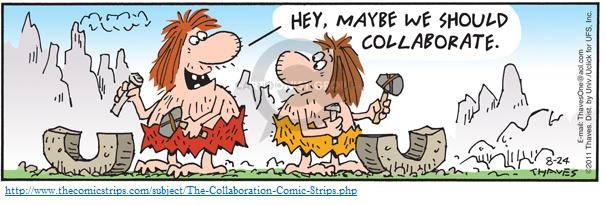Collaboration is the act of working with one or more other people to produce or create something. As undergraduate students, we were indirectly taught to collaborate by doing group projects with our classmates or be assigned lab-partners in science labs. If you were anything like I was, you probably didn’t look forward to these interactions. I really didn’t like group projects or being forced to work with a lab-partner in my undergraduate courses. Although these exercises were tedious and, at least at the time, I did not feel like they were worthwhile, in hindsight I’ve come to realize they were important exercises in building the foundational skills needed for future collaboration. Regardless of our eventual career path, it has become apparent to me that collaboration and teamwork will almost inevitably be part of nearly all career-paths. In science (and in research more broadly), the desired outcome of collaboration is usually to conduct and publish research, although other outcomes can include learning new skills and networking.
Collaboration isn’t easy, but I think the most important aspect of successful collaboration is communication. Without communication, any collaboration will fail. Whether it’s communicating about deadlines or responsibilities, having a continuous and open-line communication is very important. Another aspect of communication is managing expectations.
Highlighting realistic and achievable expectations ensures that everybody on the team is aware of what their commitments will look like in terms of time management and eventual outcomes. Without clear communication, collaborative projects likely won’t get very far and I think that making sure all team members are on the same page from start to end of a collaborative project is the best way to succeed.
As graduate students, collaboration can feel daunting, if not impossible. For me, the idea of collaboration used to feel like the kind of thing that would only happen between professors, with little room for students to be involved. However, it has become clear this isn’t the case and, in fact, I think collaboration is arguably among the most important skills that we learn in school. That being said, I think it is important to know it is possible and like many other things, it is a really important skill. For graduate students, I think there are three types of natural collaborations that we can – and should – be involved in.
First, although it may feel strange to think about your supervisor as a collaborator, it is important to know that they are your primary collaborator. Almost everything we do goes through them, including our experimental design, analyses, and ideas. This is why our supervisors are almost always co-authors on publications that come out of our theses. Importantly, this is the only type of collaboration where there is a natural leader in the collaboration – the supervisor. Our collaboration with our supervisors also revolves almost entirely around our own work, and as students, we will take their advice and incorporate it into what we do. Despite the differences between this type of collaboration and the others listed below, I think it is important we consider our supervisors as collaborators.
Second, other students in our labs or research groups can be excellent collaborators. This might start with students helping each other with analyses or providing feedback on writing, activities which could eventually develop into collaborative projects that fall outside our respective theses. Collaborating with lab-mates can be extremely rewarding and also help build a strong sense of community within our research groups. Another important aspect of collaborating with lab-mates is the ability to quickly learn new skills, for instance, analytical techniques. I have successfully been a part of this type of collaboration with people in both my former and current labs and the key to success in all cases was having great communication and realistic and clear expectations.
Third, students or professors at other institutions can be fantastic collaborators. Whether these are people you met at a conference or former lab-mates, this type of collaboration is also very rewarding, but can be more difficult due to logistic and geographic constraints. Collaboration across institutions is really important for networking and getting to know other people in your respective field. It can also be very rewarding to meet new people at conferences or within your department and realize that the very specific things that you study and find interesting are of interest to other people too! I have yet to successfully cultivate this type of collaboration, although I continue to collaborate with people I met in my former lab.
While collaboration is certainly not easy, it is an important and rewarding skill that I am happy I’ve invested time and energy in, and I encourage you to do the same! I’m not the first one to discuss collaboration as a blog topic – there are many fantastic articles out there, so if this is something you want to read more about I’d suggest checking out the links below.
http://blogs.plos.org/blog/2017/04/14/science-is-the-name-but-collaboration-is-the-game/
http://www.sciencemag.org/careers/2012/07/how-collaborate
Until next time…
~Quinn https://zp-pdl.com/get-a-next-business-day-payday-loan.php
